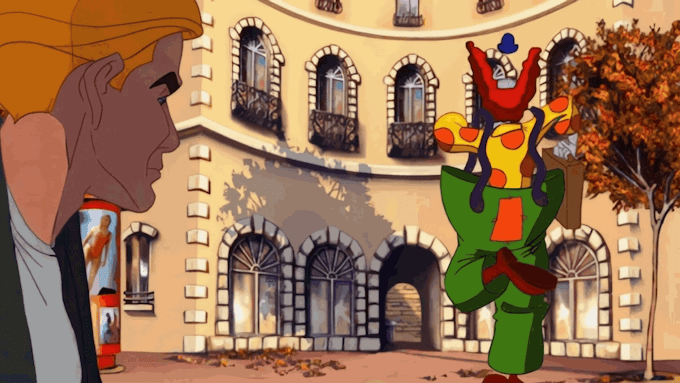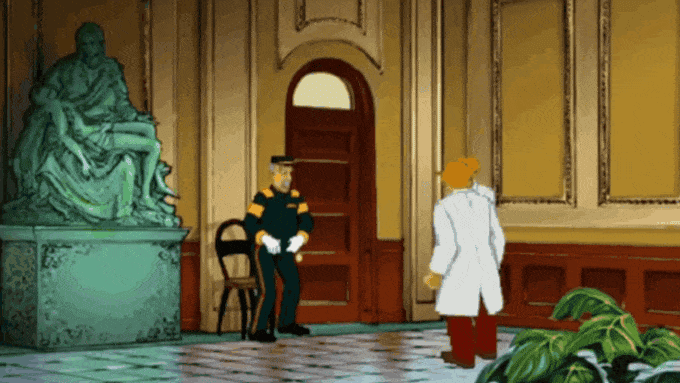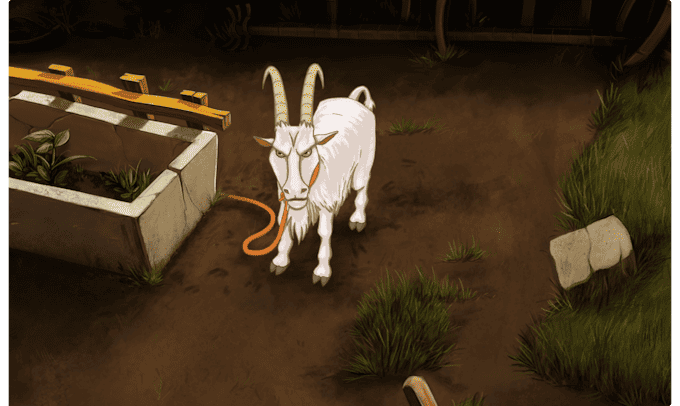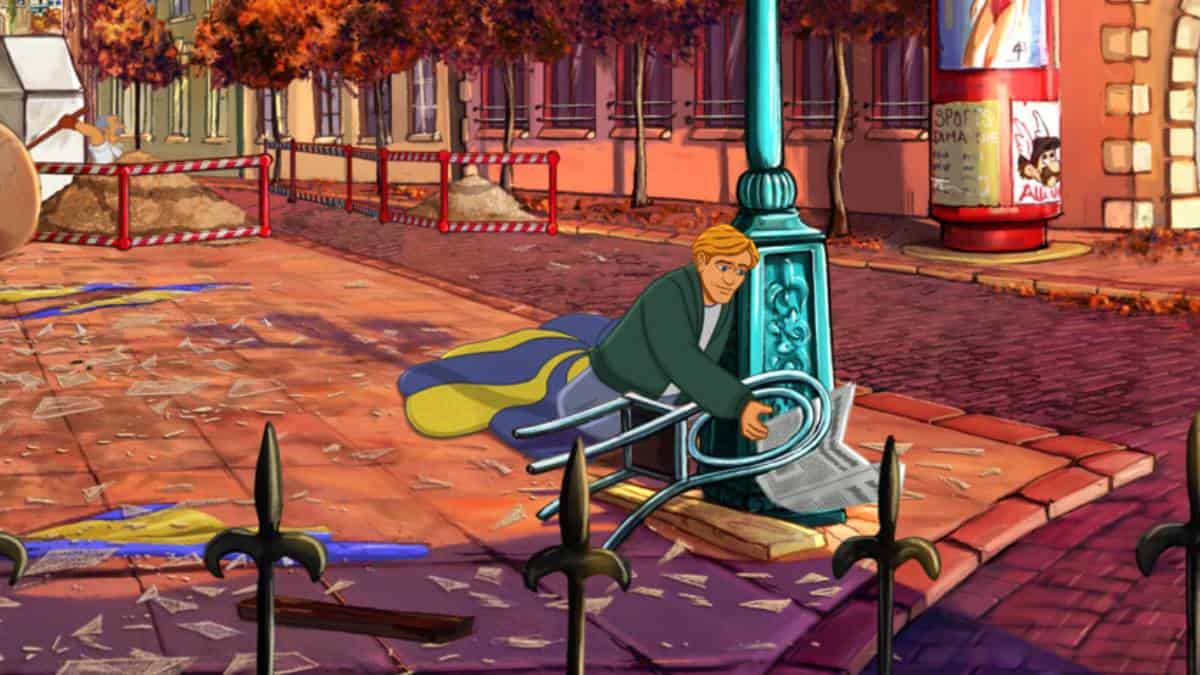Video Gamer is reader-supported. When you buy through links on our site, we may earn an affiliate commission. Prices subject to change. Learn more
Point and click adventures have a long legacy: Monkey Island, King’s Quest, and a development studio in the North of England who have weathered many storms. Revolution Software, responsible for Broken Sword and Beneath a Steel Sky, are soon to release Broken Sword: Reforged, the next title in the long-standing franchise. We’ve recently spoken with CEO Charles Cecil MBE, who founded the company back in 1990. Ahead of the next title, he’s had plenty to say about taking surprise inspiration from Candy Crush, how he feels about ‘the Adventure game’ as a genre, and why you should play the next Broken Sword game.
So first off, congratulations on the Kickstarter. Absolutely fantastic response already to Broken Sword Reforged. I assume you’re pleased with it as well?
“Really, the success is down to the testament of having incredibly loyal fans. It’s just such a privilege. People come and ask what’s the best thing about writing games, and obviously it’s lovely having great reviews, and obviously it’s lovely, you know, making a bit of money. But it’s really the stories that people tell us about what Broken Sword means to them and meeting them, which is just fantastic … We’re very lucky, particularly since you know the industry is going through some doldrums at the moment. You know, if there’s one thing you can count on, it’s the local community and we’re very, very lucky.”
Long after this interview was conducted, the Kickstarter for Broken Sword smashed through £400K, eight times higher than the £50,000 initially posed.

That leads me onto my next question very nicely. Obviously, with the turbulence in the industry at the moment, what do you think Revolution’s secrets are to sticking around for so long and still being here, and doing very well.
“Adventure games are expensive to write, they’re a niche genre, you know. We’d make much more money if we wrote games where you went around shooting people. It is absolutely down to the love from the community, which we don’t rely on, and certainly you don’t take for granted. The ability to raise part of funding through Kickstarter is really important because it’s the way we work, and that’s the way we can develop games.”
He continues: “Other people doing it a different way, people who have relied on venture capital, are now finding it very tough. People who have relied on subscription, you know, companies that went public even quite recently have lost over 90% of their value because the market conditions have changed so profoundly.”
“We write games and if they’re successful, then we do well. And if they’re not, we go bankrupt. So it’s the old fashioned way.”
As well, as you mentioned, the passion of the fans across such a long time as well. Do you think there’s also something to be said about the good will you’ve run into and managed to obtain from things like the recent Beyond the Steel Sky, that series and Broken Sword?
“Can I just add to the last answer, which kind of semi-answers this. The other thing that means an awful lot is now we have people getting into contact to say that three generations have played the game. A lot of people talk about playing the game with either a sibling or a parents, now they’re playing with their own child… Hopefully it won’t be too long until a fourth generation is playing as well. You know, there are few brands in the world that go across three generations, let alone four.”
“As far as good will is concerned … when I wrote my first game in 1981, we would go to what we called micro-fairs and they were tables, and we would sell games, and we talked to people, and it was great. We knew what people like and what they didn’t like. In particular, people didn’t like my terrible spelling.”
Cecil tells the story of a young man he met at a convention. He’d bought a Sinclair ZX81, and his wife had allowed it as it was “educating for some.” Then, she saw the spelling mistakes in-game and said, “Parzival is not spelled with a Z, and can’t really should should have an apostrophe between the N and T.” The man explains his wife became suspicious, as though Cecil was trying to pull the wool over his eyes. Cecil laments the stories that people have told him over the years, and recalls another. This time, a fan told him about an exploit in-game which allowed you to double your tally of treasure. “The games still worked,” he says, “and it was that kind of banter that was just really, really fun.”

Cecil then talks about the relationship between Revolution, as a developer, and its publishers. “We weren’t able to communicate with out community, so we didn’t really know what people wanted or liked, or whether there was any level of passion. You know the retailers were jealous of their relationship, they didn’t want publishers to have a direct relationship.” Publishers too, he says. “That was why it was so exciting when everything came crashing down in the late 2000s with digital distribution and social media. Certainly, everything changed. One of my enduring memories was asking the fine guys at the Apple flagship store in Regent Street whether we could do a launch. And the guy, called Robin Lingwood, said we’ve got the cast of Vampire Diaries next week, Robbie Williams in three weeks, but we’ve got nothing in two weeks if you want to come along.”
“But we’ve got no money,” Cecil said. “It was already embarrassing. Just before I commit, can you tell me how much it will cost?” The Apple correspondent had said “it doesn’t cost anything, it’s part of the promotion.” Cecil picks up again, “So we organised it, and I was terrified that nobody was going to come along. And of course, loads, I mean it was absolutely full, people queuing around the block, people flown in from Europe – it was absolutely incredible, and that was the first time we could see directly that we have such a passionate audience. We didn’t know because they couldn’t communicate with us … It basically gives a relationship that I think works very well compared to a bigger company.”
He also reveals how the games inclusion in Apple’s “12 Days of Christmas” changed things for the games they were developing. They had half a million downloads, which “common sense and logic told you that there was a big market to buy it, who then got it for free, and that meant sales would drop … It was like the rule-book for physical had just been torn up … and that’s when Kickstarter came along.”
Why is now the right time to do Broken Sword: Reforged?
Cecil: “Our team worked on Beyond the Steel Sky and loved it. A lot of people have come to us and asked when we will bring Broken Sword to new consoles. ‘It doesn’t matter if it’s the same,’ [they said] and ‘it doesn’t matter if it’s low-res. We just want to play it on PlayStation, Xbox and Switch.’ And, quite clearly, it does matter. I was very inspired by quite a negative way by a number of adventures that came out in the last couple of years.”
Cecil says he played them, and found them very dull. “If I’m finding these Adventures dull, then there’s no wonder why the genre is declining … The gameplay experience is exactly the same as it was in the 90s, it just hasn’t been brought up to date.”
Cecil then says that the challenge for developers is to “reinvent the adventure, so it’s still the same adventure.”
“And I was kind of inspired by a game that really doesn’t inspire me at all: Candy Crush” … “The best thing about it,” Cecil says, is the “little sparkles” to look in a certain direction. “Yes! That’s the solution. But it was me that worked it out. I wasn’t told the solution, so we will also have little sparkles; just look in this direction.” He continues, “Hopefully, the player will know. ‘If I’m stuck, it is going to come along and help me’”
Broken Sword will make players question if they really want hints, put the power of agency into their own hands, because as Charles Cecil says, “The adventure, more than most other genres, is all about making you feel smart, and you want to keep feeling smart and the moment you go look for a hint, you feel like a failure – in my view.”
The Broken Sword story is obviously a massive part of why people love the franchise – do you have any opinions on the stories in modern games at the moment, and how anything’s been inspired by [Broken Sword], if you can see bits of its storytelling in modern games today, or if you think they should be looking towards the franchise.
Cecil responds boldly – “In adventure games, we work with pioneers” … “Yes, people have copied them, but then we were inspired, of course ourselves, by King’s Quest and games like that. For me, imitation is the sincerest form of flattery, and I will give full credit. So yes, there are still games using the Broken Sword system, but I would say that the system felt revolutionary in 1996, definitely.”
He continues, “Our job now is to make it feel contemporary in 2024. If we succeed, then undoubtedly people will copy us, and that will be great! And then, they’ll bring new ideas and we’ll copy them.”
“The really nice thing about being a developer, in particular an Adventure developer, is we all kind of know that we’re not really competing with each other. If somebody buys an Adventure and gets into it, then they’ll buy ours later and vice versa. So the really nice thing about adventure developers and developers in general is that we all get on really well.”
“One because we like each other, then two, because we’re not actually competitors; we are collaborators.”
“Is there anything from going back to revisiting the OG broken Sword and Reforged that you think has shaped the direction you’re going for the new game as well?”

“Yep, actually if we go to Beyond the Steel Sky, if you don’t mind, which I don’t know if you’ve ever played. So in it, we have the ability to hack into the system here, and that worked really well. It didn’t feel like a mini-game, and mini-games are kind of an admission that you’ve run out of ideas. And for Beyond the Steel Sky, the link hacking worked really well and was integral to the gameplay. So with Parzival’s Stone what I’m looking for is not mini games, absolutely not mini games, but look for elements that add another dimension and build on top of the puzzles. Because ultimately, the problem as a developer of Adventure games is that it’s quite hard to make puzzles hard enough to satisfy people. There’s two solutions. The first is that you come up with slapstick puzzles, you know I love Monkey Island, but the idea that you need to undo a bolt, and to do it you need to get a monkey, and to get the monkey you need to get a banana and put it on a metronome, these are all really fun puzzles, but you’re rewarded in retrospect. There’s no way you could have know that putting the monkey in your pocket was going to create a Monkey Wrench. So, slapstick puzzles is one way of doing it. I think they’re probably quite easy.”

“It’s really quite hard coming up with puzzles that are challenging, and are trye to the character motivations and the stories of that time. And I am quite proud, I think we’ve done a pretty reasonable job of that over our Broken Sword games. And I think that’s one of the reasons they’ve endured. As tastes have changed, the desire for those games which did rely on slapstick puzzles, Disc World for example, you know it was really funny and fun. The puzzles didn’t make any sense, and they were quite proud of that – it was part of the slapstick. We on the other hand have always tried to make them logical – apart from goat, which was an unfair puzzle. But broadly, if you as a player, take the time to talk to people and understand the world, hopefully you’ll find there is a logical solution, and certainly with this closing down of hotspots, and reducing the number of permutations, and also giving people little hints. Hopefully that will address the key concerns that I have about how [Adventure games] in many ways, haven’t translated to a new audience in the 21st century.”

Have you got anything you’d like to say to anyone who hasn’t played a Broken Sword before, but is curious to start trying with Reforged. What do you say to those people?
“Honestly, for the people who take the time – it’s quite a high barrier to entry – it’s much easier to play Candy Crush. It’s much easier to play many of these casual games, but, the people who do persevere absolutely love them because there’s a strong story being driven forward – you will feel smart because hopefully the puzzles don’t feel like puzzles, but interesting narrative challenges. And, give it a go, play it for an hour, and you know you may like it like so many people that find it is phenomenal.”
“We had this lad come in for work experience, And he was a gamer, mostly first person shooters, but okay, we got him to play the original Broken Sword. Not even this new one. And he absolutely loved it, and i’m going to quote what he said: I love this game, i didn’t know games like this existed. It allowed me to play the games in my own time, which is exactly what the whole cosy movement is all about. You know, games that you can play at your own rate and there isn’t violence and it’s fun to play. He said it was like discovering Video Games for the first time again, which I love that line. Obviously you know, a very smart kid, but then people who play Adventures are broadly smart, and if they weren’t, they’d be playing other genres.”
All images of Revolution Software’s games credited to them.
